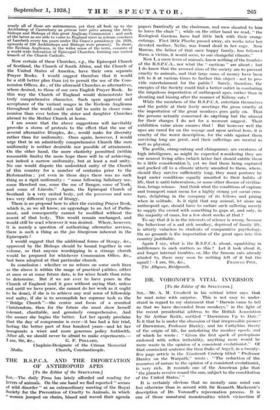THE R.S.P.C.A. AND THE IMPORTATION OF ANTHROPOID APES
[To the Editor of the SPECTATOR.] Sia,—The daily Press has lately afforded sad reading for lovers of animals. On the one hand we find reported " scenes of wild disorder " at an extraordinary meeting of the Royal Society for the Prevention of Cruelty to Animals, in which " women jumped on chairs, hissed and waved their agenda papers frantically at the chairman, and men shouted to him to leave the chair " ; while on the other hand we read, " the Zoological Gardens have had little luck with their orang- outangs. First little Phoebe passed away, six weeks later her devoted mother, Nellie, was found dead in her cage. Now Marcus, the father of that once happy family, has followed them, a victim, it would seem, to our changeful climate."
Now I, a mere lover of animals, know nothing of the troubles of the R.S.P.C.A., nor what the " ructions " are about ; but I do know that the avowed aims of the society are to prevent cruelty to animals, and that large sums of money have been left to it at various times to further this object—not to pro- vide entertainment for the public ! Surely, therefore, the energies of the Society could find a better outlet in combating the iniquitous importation of anthropoid apes, rather than in shouting and hissing after the manner of Killeny cats ?
While the members of the R.S.P.C.A. entertain themselves and the public at their lively meetings the gross cruelty of the importation of the great monkeys goes gaily on. That the persons actually concerned do anything but the utmost for their charges I do not for a moment suggest. Their exhibition value alone ensures that ! But however well the apes are cared for on the voyage and upon arrival here, it is cruelty of the worst description, for the odds against them surviving long are great, and their sufferings are mental as well as physical.
The gorilla, orang-outang and chimpanzee, are creatures of high intelligence, as might be expected considering they are our nearest living allies (which latter fact should entitle them to a little consideration !), yet we find them being captured and packed off to a climate utterly unsuited to them, where, should they survive sufficiently long, they must perforce be kept under conditions equally unsuited to their habits of life, that is until tuberculosis, or some other disease of civiliza- tion, brings release. And think what the conditions of capture and transport must mean for a highly strung yet social crea- ture, delighting in the company of its fellows and pining when in solitude. Is it right that any animal, let alone an anthropoid ape, should have to endure such suffering merely to supply the crowd with something to gape at, and only, in the majority of cases, for a few short weeks at that ?
To say that it is in the interests of science is wrong, because the behaviour of a sad sick monkey, deprived of family life, is utterly valueless to students of comparative psychology. On no grounds is the importation of the great apes into this country justifiable.
Again I say, what is the R.S.P.C.A. about, squabbling in indifference to such matters as this ? Let it look about it, and forget internal troubles, or, like the famous cats already alluded to, there may soon be nothing left of it but the






























 Previous page
Previous page